 Backend Development
Backend Development PHP Tutorial
PHP Tutorial In-depth understanding of the underlying development principles of PHP: concurrent programming and multi-threading
In-depth understanding of the underlying development principles of PHP: concurrent programming and multi-threading
In-depth understanding of the underlying development principles of PHP: concurrent programming and multi-threading
1. Introduction
With the rapid development of the Internet, more and more Applications need to handle a large number of concurrent requests. Concurrent programming can improve application performance and efficiency while optimizing user experience. As a widely used programming language, PHP is no exception. An in-depth understanding of the underlying development principles of PHP, especially the implementation of concurrent programming and multi-threading, is of great significance to improving the performance of PHP applications. This article will explore this topic.
2. PHP underlying development principle
PHP is a scripting language that usually runs on the server side. Its underlying implementation mainly relies on the PHP interpreter and the accompanying Zend engine. Zend engine is the core component of PHP and is responsible for parsing and executing PHP scripts. During the execution process, the PHP interpreter converts the script into an executable instruction set and executes it according to certain rules.
In the underlying development of PHP, there is an important programming model that is widely used, that is, processes and threads. A process is the smallest unit for the operating system to allocate resources and perform tasks, while a thread is a sub-task of a process and can be executed concurrently. In the underlying development of PHP, implementing concurrent request processing through multi-thread programming can improve the concurrency capability of the system.
3. Concurrent programming and multi-threading
- The concept of concurrent programming
Concurrent programming is a programming model that allows multiple tasks to be executed simultaneously . In PHP applications, implementing concurrent programming can improve the concurrency capabilities of the system. Concurrent programming is usually implemented using multi-threading or multi-process methods, and it is also necessary to consider the relationship between coordination and synchronization of multiple tasks.
- The concept of multi-threading
Multi-threading refers to starting multiple threads in a process so that these threads can perform different tasks at the same time. Each thread has its own program counter, register set, and stack, but they share the process's memory space. Multi-threading can improve the concurrency performance of the system and take full advantage of multi-core processors and multi-threading.
4. Multi-threaded programming in PHP
Although PHP is a single-threaded programming language, the underlying development principles of PHP support multi-threaded programming. Multi-threaded programming in PHP mainly relies on the Zend engine and related extensions. The following are commonly used multi-threaded programming methods in PHP:
- Pthreads extension
Pthreads is a commonly used multi-threaded programming extension in PHP. It provides the ability to create and manage multiple Thread interface. Using the Pthreads extension, you can easily create and manage multiple threads in PHP code and implement concurrent request processing. The Pthreads extension provides basic functions such as thread creation, destruction, and synchronization to facilitate concurrent programming.
- Swoole extension
Swoole extension is a very powerful concurrent programming extension in PHP, which has gradually become popular in recent years. It provides a rich asynchronous programming interface and supports multi-threading and coroutine programming. Through Swoole extension, highly concurrent network communication and request processing can be achieved. Swoole extension has great advantages in performance and functionality, and is a very important part of the underlying development of PHP.
- Workerman Framework
Workerman is a high-performance asynchronous event-driven framework developed based on PHP, supporting multi-process and multi-thread methods. It provides a rich network programming interface that can be used to quickly develop high-concurrency network applications. Through the Workerman framework, very efficient concurrent request processing can be achieved and the performance of PHP applications can be improved.
5. Conclusion
Concurrent programming and multi-threading in the underlying development principles of PHP are of great significance to improving the performance of PHP applications. By in-depth understanding and mastering relevant knowledge, you can make full use of PHP's underlying development capabilities and achieve efficient concurrent request processing. Whether you use Pthreads extension, Swoole extension or Workerman framework, you can achieve high concurrency performance and good user experience in PHP applications.
Finally, I hope this article can help readers gain an in-depth understanding of concurrent programming and multi-threading in PHP's underlying development principles, and apply them to actual development to fully utilize the potential of PHP. Let us explore the mysteries of PHP underlying development together and continue to work hard to build more efficient and stable applications!
The above is the detailed content of In-depth understanding of the underlying development principles of PHP: concurrent programming and multi-threading. For more information, please follow other related articles on the PHP Chinese website!
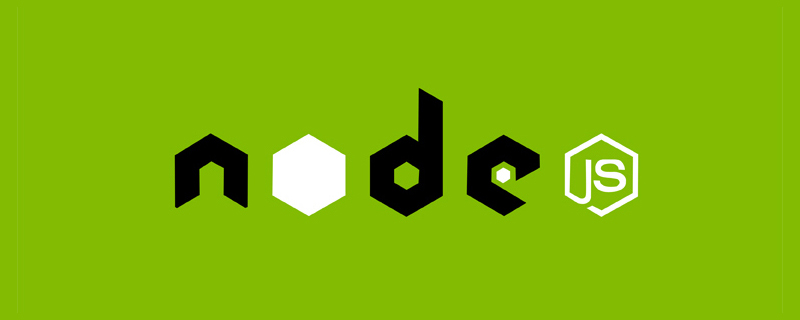 聊聊Node.js中的多进程和多线程Jul 25, 2022 pm 07:45 PM
聊聊Node.js中的多进程和多线程Jul 25, 2022 pm 07:45 PM大家都知道 Node.js 是单线程的,却不知它也提供了多进(线)程模块来加速处理一些特殊任务,本文便带领大家了解下 Node.js 的多进(线)程,希望对大家有所帮助!
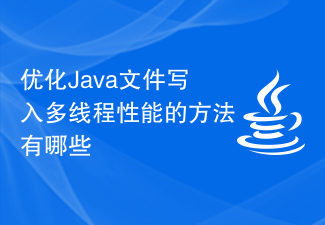 优化Java文件写入多线程性能的方法有哪些Jul 01, 2023 am 10:05 AM
优化Java文件写入多线程性能的方法有哪些Jul 01, 2023 am 10:05 AMJava开发中如何优化文件写入多线程并发性能在大规模数据处理的场景中,文件的读写操作是不可避免的,而且在多线程并发的情况下,如何优化文件的写入性能变得尤为重要。本文将介绍一些在Java开发中优化文件写入多线程并发性能的方法。合理使用缓冲区在文件写入过程中,使用缓冲区可以大大提高写入性能。Java提供了多种缓冲区实现,如ByteBuffer、CharBuffe
 如何优化C++开发中的多线程调度效率Aug 22, 2023 am 09:33 AM
如何优化C++开发中的多线程调度效率Aug 22, 2023 am 09:33 AM在当今的软件开发领域中,多线程编程已经成为了一种常见的开发模式。而在C++开发中,多线程调度的效率优化是开发者需要关注和解决的一个重要问题。本文将围绕如何优化C++开发中的多线程调度效率展开讨论。多线程编程的目的是为了充分利用计算机的多核处理能力,提高程序运行效率和响应速度。然而,在并行执行的同时,多线程之间的竞争条件和互斥操作可能导致线程调度的效率下降。为
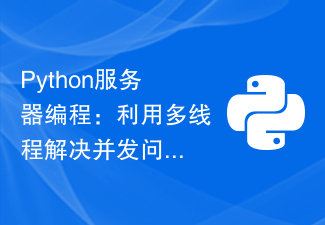 Python服务器编程:利用多线程解决并发问题Jun 19, 2023 am 08:45 AM
Python服务器编程:利用多线程解决并发问题Jun 19, 2023 am 08:45 AM随着互联网的发展,越来越多的应用程序被开发出来,它们需要处理并发请求。例如,Web服务器需要处理多个客户端请求。在处理并发请求时,服务器需要同时处理多个请求。这时候,Python中的多线程技术就可以派上用场了。本文将介绍如何使用Python多线程技术解决并发问题。首先,我们将了解什么是多线程。然后,我们将讨论使用多线程的优点和缺点。最后,我们将演示一个实例,
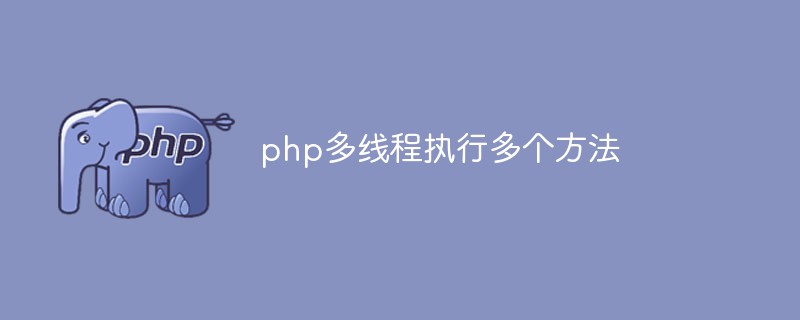 如何使用PHP多线程执行多个方法Mar 23, 2023 pm 02:11 PM
如何使用PHP多线程执行多个方法Mar 23, 2023 pm 02:11 PM在PHP开发中,经常会遇到需要同时执行多个操作的情况。想要在一个进程中同时执行多个耗时操作,就需要使用PHP的多线程技术来实现。本文将介绍如何使用PHP多线程执行多个方法,提高程序的并发性能。
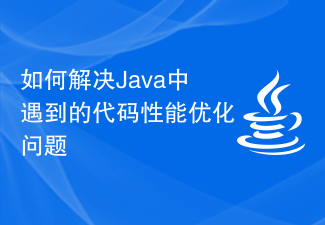 如何解决Java中遇到的代码性能优化问题Jun 29, 2023 am 10:13 AM
如何解决Java中遇到的代码性能优化问题Jun 29, 2023 am 10:13 AM如何解决Java中遇到的代码性能优化问题随着现代软件应用的复杂性和数据量的增加,对于代码性能的需求也变得越来越高。在Java开发中,我们经常会遇到一些性能瓶颈,如何解决这些问题成为了开发者们关注的焦点。本文将介绍一些常见的Java代码性能优化问题,并提供一些解决方案。一、避免过多的对象创建和销毁在Java中,对象的创建和销毁是需要耗费资源的。因此,当一个方法
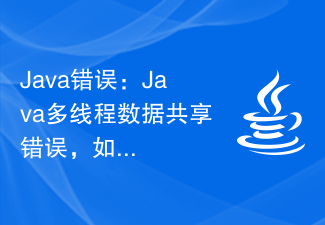 Java错误:Java多线程数据共享错误,如何处理和避免Jun 25, 2023 am 11:16 AM
Java错误:Java多线程数据共享错误,如何处理和避免Jun 25, 2023 am 11:16 AM随着社会的发展和科技的进步,计算机程序已经渐渐成为我们生活中不可或缺的一部分。而Java作为一种流行的编程语言,以其可移植性、高效性和面向对象特性等而备受推崇。然而,Java程序开发过程中可能会出现一些错误,如Java多线程数据共享错误,这对于程序员们来说并不陌生。在Java程序中,多线程是非常常见的,开发者通常会使用多线程来优化程序的性能。多线程能够同时处
 刨析swoole开发功能的多线程与多进程调度方式Aug 05, 2023 pm 01:43 PM
刨析swoole开发功能的多线程与多进程调度方式Aug 05, 2023 pm 01:43 PM刨析swoole开发功能的多线程与多进程调度方式随着互联网技术的发展,对服务器性能的要求越来越高。在高并发场景下,传统的单线程模型往往无法满足需求,因此诞生了多线程和多进程调度方式。swoole作为一种高性能的网络通信引擎,提供了多线程和多进程的开发功能,本文将对其进行深入分析和探讨。一、多线程调度方式线程概念介绍线程是操作系统能够进行运算调度的最小单位。在


Hot AI Tools

Undresser.AI Undress
AI-powered app for creating realistic nude photos

AI Clothes Remover
Online AI tool for removing clothes from photos.

Undress AI Tool
Undress images for free

Clothoff.io
AI clothes remover

AI Hentai Generator
Generate AI Hentai for free.

Hot Article

Hot Tools

ZendStudio 13.5.1 Mac
Powerful PHP integrated development environment

SAP NetWeaver Server Adapter for Eclipse
Integrate Eclipse with SAP NetWeaver application server.

EditPlus Chinese cracked version
Small size, syntax highlighting, does not support code prompt function

DVWA
Damn Vulnerable Web App (DVWA) is a PHP/MySQL web application that is very vulnerable. Its main goals are to be an aid for security professionals to test their skills and tools in a legal environment, to help web developers better understand the process of securing web applications, and to help teachers/students teach/learn in a classroom environment Web application security. The goal of DVWA is to practice some of the most common web vulnerabilities through a simple and straightforward interface, with varying degrees of difficulty. Please note that this software

Atom editor mac version download
The most popular open source editor





